03-05 March 2020
BONUS-OPTIMUS Final meeting inTjärnö
All BONUS-OPTIMUS partners participated in the final meeting at Tjärnö Marine Laboratory in Sweden over three days. All final results from Work Packages were presented and discussed, as well as further endeavors to follow up on research conducted under the project. A short trip to the Kosterhavet National Park and Ostrea, a flat oyster hatchery on South Koster island.

A productive meeting with a collaborative group
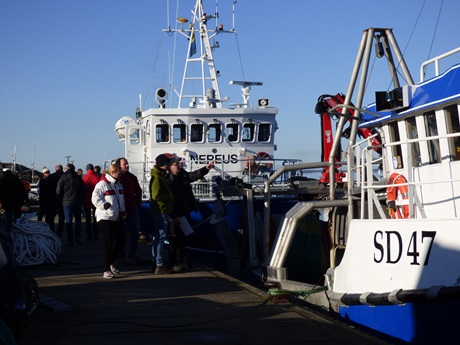
On Koster Islands
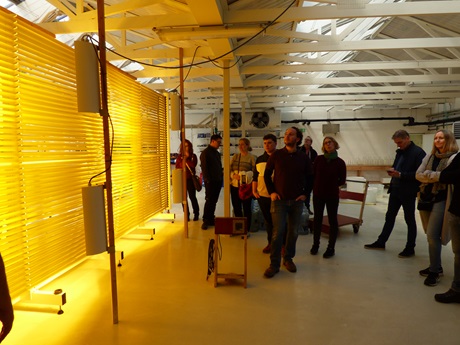
Visiting Ostrea
03 March 2020
BONUS-OPTIMUS present at HELCOM Stakeholder Conference in Helsinki
The BONUS OPTIMUS project was selected to give a presentation regarding “Mussel cultivation as a marine mitigation measure” in the Eutrophication parallel session of the HELCOM Stakeholder Conference 2020 “For a sustainable Baltic Sea: The Baltic Sea Action Plan beyond 2021”.
This stakeholder conference gives the different stakeholders the opportunity to express their views on the updated Baltic Sea Action Plan (BSAP), part of HELCOM’s strategic programme of actions and measures.
BONUS-OPTIMUS results were presented both during the closing plenary of the HELCOM Stakeholder Conference and the ensuing back-to-back Meeting of the Helsinki Commission (HELCOM 41-2020)
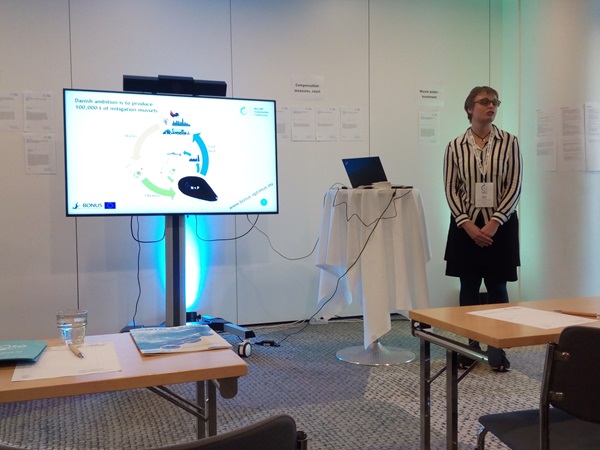
07-10 October 2019
BONUS-OPTIMUS presentation at Europe Aquaculture conference in Berlin
Last week,a BONUS-OPTIMUS delegation went to present some results from the project at the Europe Aquaculture conference in Berlin. Five talks and 2 e-posters were presented during the conference in the Mollusc Production and restoration session. The program can be consulted there
E-posters can be seen there:https://www.was.org/AquaEas/Program/PaperDetail/29968 or click below for the links
Lukas Ritzenhofen et al. Mytilus LARVAE IN THE SOUTH WESTERN BALTIC SEA – A BASIS FOR MUSSEL FARMING
Ane Pastor Rollan et al. Modelling mussel larval distribution for optimal site selections of mussel farming
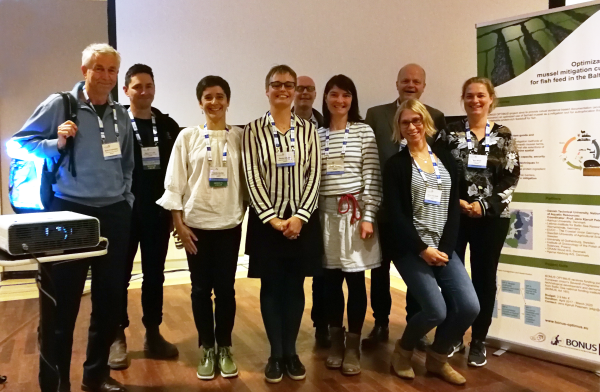
The Bonus-Optimus delegation below with from Left fo right: Gérald Shernewsky (Leibniz-Institute for Baltic Sea Research, DE), Daniel Taylor, Camille Saurel, Pernille Nielsen (DTU Aqua, DK), Lars Kjerulf Petersen (AU, DK), Nardine Stybel (EUCC, DE), Jens Kjerulf Petersen (DTU Aqua), Anna-Lucia Buer (Leibniz-Institute for Baltic Sea Research, DE), and Marie Maar (AU, DK). And Lukas Ritzenhofen (Leibniz-Institute for Baltic Sea Research, DE) unfortunately not on the picture
Presentations:
Anna-Lucia Buer, Lukas Ritzenhofena, Marie Maarb, Gerald Schernewskia PRODUCTION POTENTIAL OF BLUE MUSSEL Mytilus spp. FARMING ALONG THE SALINITY GRADIENT OF THE GERMAN BALTIC SEA
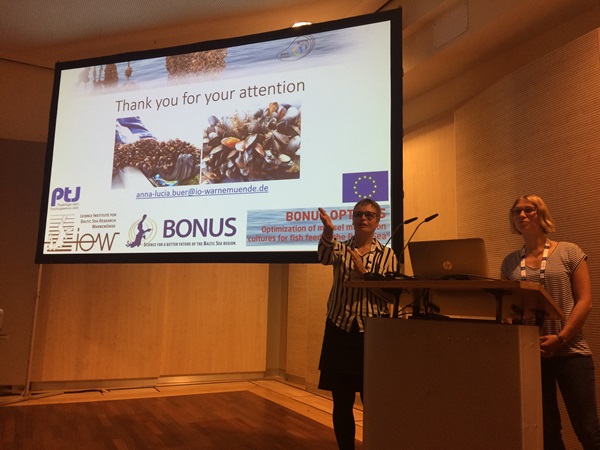
M. Maar, A. Holbach, K. Timmermann, D. Taylor SPATIAL MODELLING OF BLUE MUSSEL FARM PRODUCTION POTENTIAL IN THE WESTERN BALTIC SEA

Daniel Taylor, Camille Saurel, Pernille Nielsen, Finn Bak, Niels-Peter Nielsen, Jens Kjerulf Petersen OPTIMIZING PRODUCTION OF MITIGATION MUSSELS
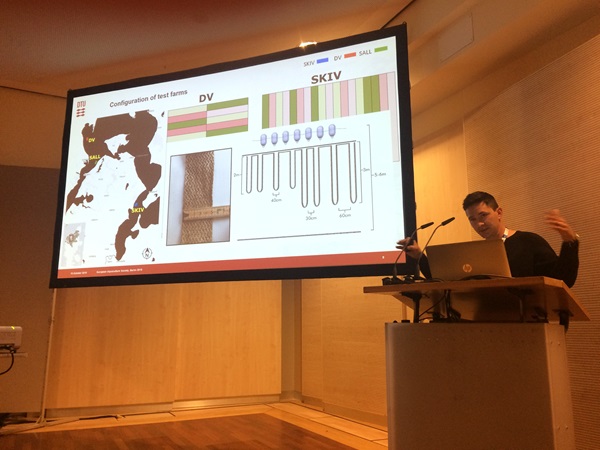
Gerald Schernewski, Rene Friedland ZEBRA-MUSSEL (DREISSENA) CULTIVATION IN BALTIC COASTAL WATERS – AN OPTION FOR BLUE GROWTH AND WATER POLICY IMPLEMENTATION?
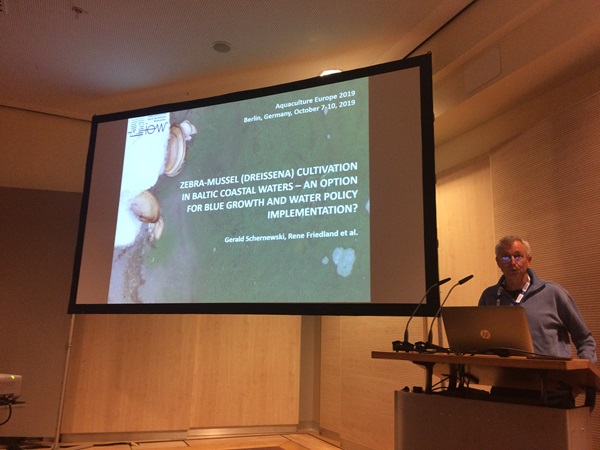
Lars Kjerulf Petersen, Nardine Stybel LOCAL ACCEPTANCE OF MUSSEL CULTIVATION IN THE BALTIC SEA
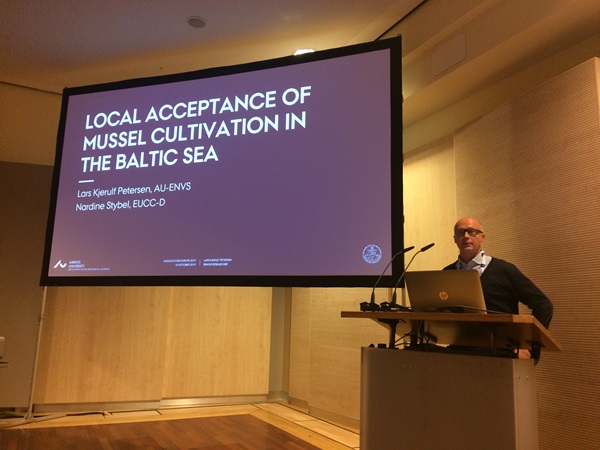
30 September 2019
Phytoplankton Depletion Campaign
Last week, researchers from the Danish Shellfish Center and Aarhus University conducted an intensive monitoring campaign in a large scale mitigation mussel farm in the Limfjorden to quantify phytoplankton depletion. Discrete and continuous transects were conducted daily, as well as sampling for in vivo particle characterization and flow cytometry. Depletion gradients around mussel aggregates in the canopy were also analyzed with a sampling array at fixed distances. Additionally, clearance rate experiments were carried out at different sections of the farm. Two ADCPs were deployed to track hydrodynamics outside and within the farm area. Coupling multiple scales of depletion analyses with plankton community-level detail and high spatial resolution of chlorophyll-a advances our understanding of large-scale depletion dynamics.
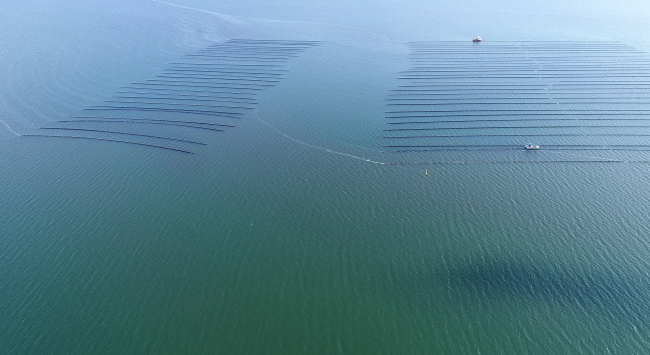
Northern section of the farm with Egon P and Fjordrejen (DSC boats) conducting measurements in the boundary layer around mussels
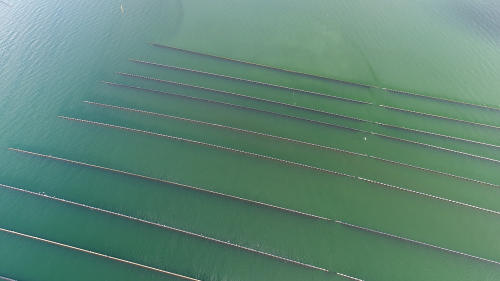
Local depletion follows hydrodynamics in relation to the farm configuration
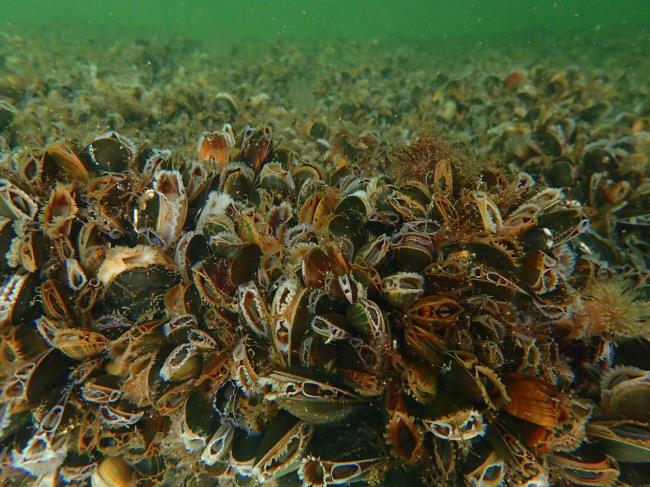
Mussel aggregates on a net. Several tons of mussels are attached to each net in the farm.
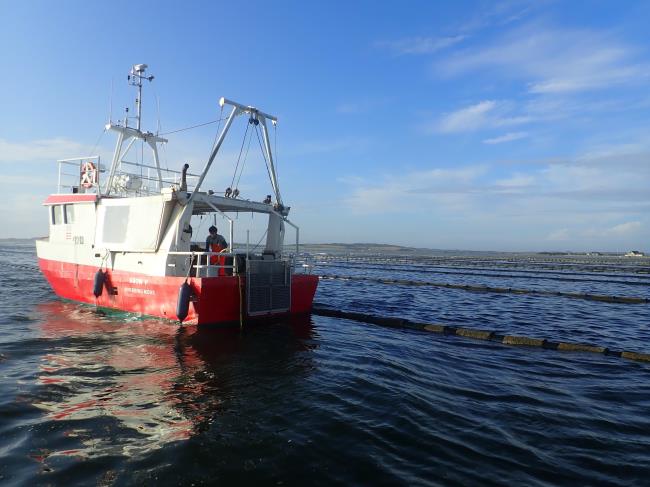
Egon P attached to a tube, performing measurements and experiments
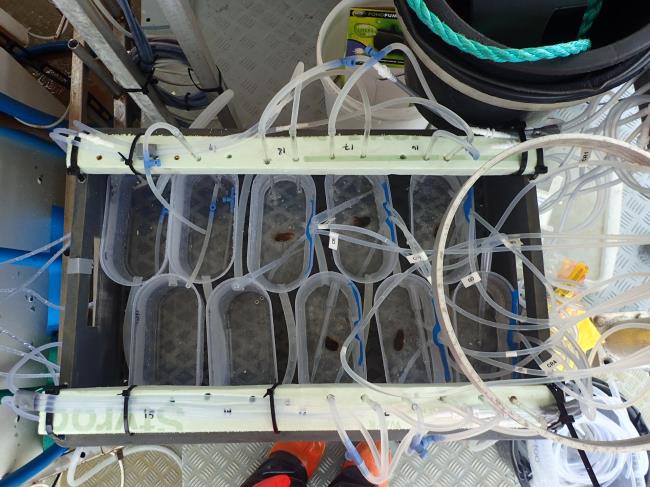
Clearance rate experimental setup onboard Egon P
PhD Course: Mussel mitigation cultures; mussel growth, environmental quality and site selections
Registration for the course has ended, if you would like to learn more or join the course, contact Dr. Marie Maar (mam@bios.au.dk).
8 April 2019
Conference on Mussel Cultivation in the Baltic Sea
Nearly 40 experts from science, administration, NGOs and industry met in Warnemünde on 19.3.2019 and discussed the current situation of mussel farms for water quality improvement in the Baltic Sea. Based on current results from research farms in Mecklenburg-Western Pomerania (Wieker Bodden / Greifswalder Bodden), Schleswig-Holstein (Kiel Bay) and Denmark (Mariager Fjord), ecological aspects such as the growth behavior of mussels, their effects on the sediment and the realized nutrient reduction after harvesting were discussed. What is not yet possible in Germany can already be applied in Denmark where mussel farms are regarded as a recognised measure for nutrient reduction and can help to achieve the objectives of the Water Framework Directive. The careful selection of mussel farm sites was discussed as being the most important criterion to be able to comply with the prohibition of deterioration. Undisputed were the ecosystem services associated with shellfish. However, these would have to be better publicised in order to increase the acceptance of mussel farms. At the end of the event, possibilities for financing ecosystem services were presented.
The event was realized as part of the projects Baltic Blue Growth, BONUS OPTIMUS and LiveLagoons and for the first time, made it possible to have an information exchange between relevant German authorities in Mecklenburg-Vorpommern and Schleswig-Holstein. Organizers were EUCC – The Coastal Union Germany (EUCC-D), Ministry of Energy, Agriculture, the Environment, Nature and Digitalization Schleswig-Holstein, Dep. 2: Agriculture, Sanitary Consumer Protection and Fisheries and Leibniz-Institute for Baltic Sea Research Warnemuende.
The presentations will be available shortly at the conference website: https://www.eucc-d.de/baltic-blue-growth/articles/konferenz-zur-muschelkultivierung-in-der-ostsee.html
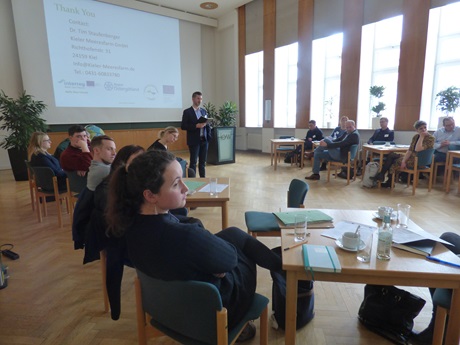
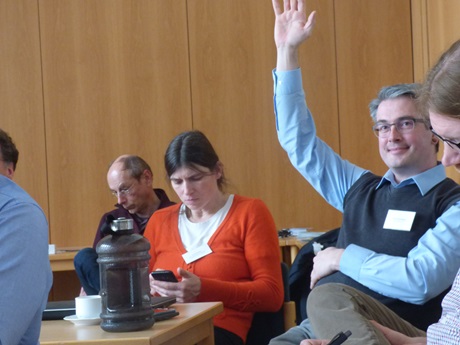
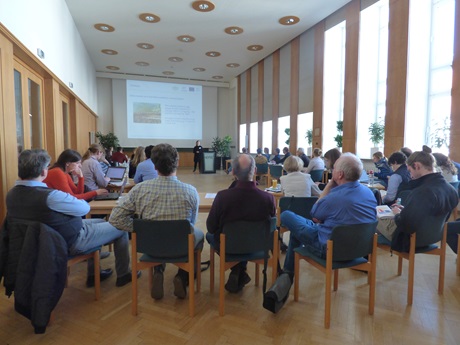
15 March 2019
Next stakeholder meeting and conference in Warnemuende, Germany
On 19th March 2019 the second OPTIMUS stakeholder meeting will take place in Warnemuende, Germany. It will focus on the mussel growing season 2018 and the results of the two mussel research plants in low saline waters of Greifswalder Bodden and Wieker Bodden installed within BONUS Optimus. The results will be compared with other farms in Germany and the Baltic Sea. Therefore, the event will cooperate with the Interreg project Baltic Blue Growth that will be finished in April 2019.
The event will give a broad overview about the situation of Baltic Sea mussel farming in Sweden, Denmark and Germany enabling intensive discussions about transferability and future prospects. It is organized by EUCC – The Coastal Union Germany (EUCC-D), Ministry of Energy, Agriculture, the Environment, Nature and Digitalization Schleswig-Holstein, Dep. 2: Agriculture, Sanitary Consumer Protection and Fisheries and Leibniz-Institute for Baltic Sea Research Warnemuende.
Date: 19.03.2019
Location: Leibniz-Institute for Baltic Sea Research Warnemuende, Seestr. 15, D-18119 Rostock (Main Hall)
Contact: stybel@eucc-d.de
25 February 2019
Final field campaign monitoring the benthic impacts of Mitigation Mussel Cultivation
The fourth and final campaign in As Vig, Denmark, evaluating benthic impacts of a mitigation mussel farm, has wrapped up. Over the past 19 months, the University of Gothenburg and DTU Danish Shellfish Center have conducted four field campaigns with Gothenburg's benthic lander systems to characterize chemical fluxes in the sediments within a mitigation farm and at a reference position in the southern Kattegat. Several biophysical processes are expected to influence sedimentation processes around mussel farms, including mussel filtration and egestion of organic matter, and the hydrodynamic influence of a submerged canopy on suspended material. Modification of ambient sedimentation processes can result in modified processes regulating benthic nutrient cycling. As mitigation farms intend to extract nutrients from the environment, it is important to detail associated effects within the environment that may impact the fate of nutrients in a comprehensive manner. These campaigns have captured valuable data sets to quantify and describe many of these processes in situ, such as denitrification, dissimilatory nitrate reduction to ammonium, methanogenesis, oxygen consumption, and sedimentation rates. Sediment sampling during the campaigns is assessing porosity, grain size, presence of infauna, pore water nutrient concentrations, and algal pigment composition of microphytobenthos. Current magnitude and direction of the water column was monitored within the farm and at the reference position for the duration of the campaigns.
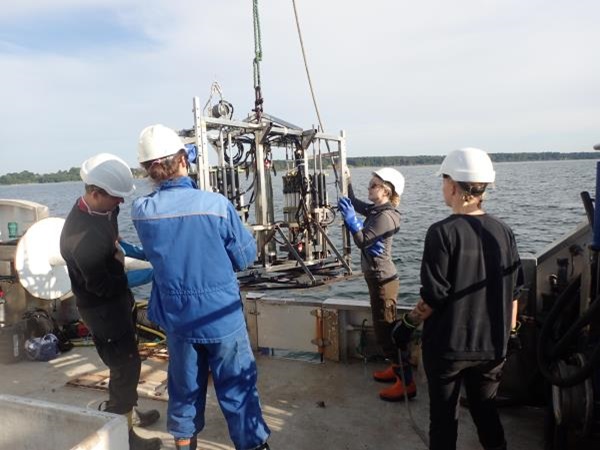
The UGOT lander team (left to right): Per Bergström, Mikhail Yurievich Kononets, Astrid Hylén, and Anna Stedt
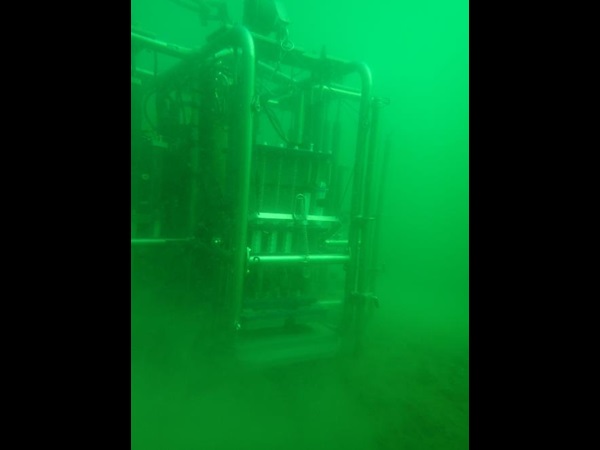
The 'Big' benthic lander, in operation at the sea floor
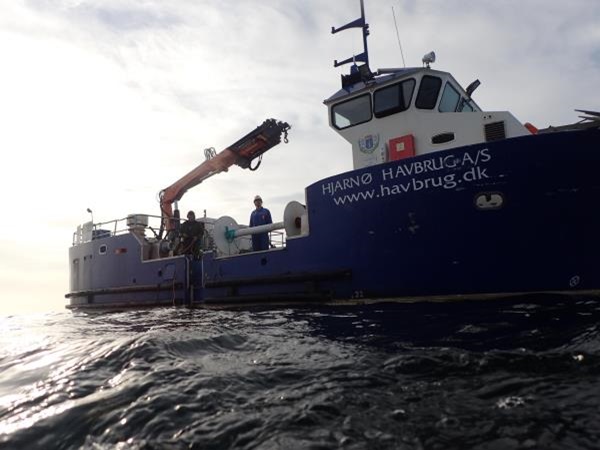
The working boat for the campaigns, Thor P
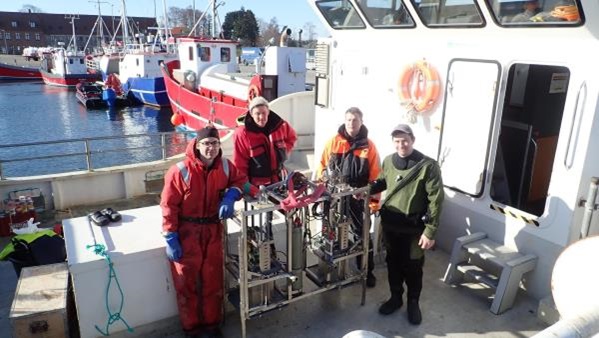
Happy members of the campaign team on the final day with the 'small' lander. Astrid Hylén is not pictured but was present.
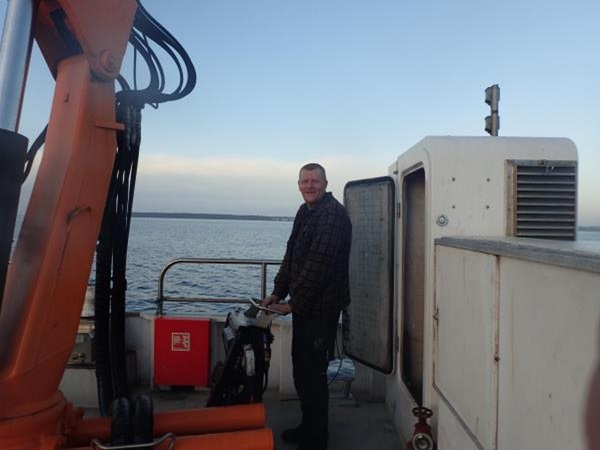
Skipper Hans Rudin, Hjarnø Havbrug
More BONUS OPTIMUS news